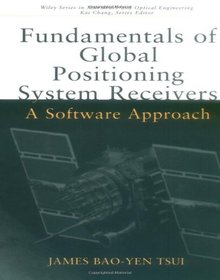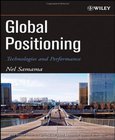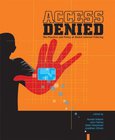Fundamentals of Global Positioning System Receivers
A Software Approach

Book Details:
| Publisher: | Wiley-Interscience |
| Series: | Wiley , Fundamentals |
| Author: | James Bao-yen Tsui |
| Edition: | 1 |
| ISBN-10: | 0471381543 |
| ISBN-13: | 9780471381549 |
| Pages: | 258 |
| Published: | May 19 2000 |
| Posted: | Nov 19 2014 |
| Language: | English |
| Book format: | |
| Book size: | 2.63 MB |
Book Description:
How to build and operate GPS receivers-a working resource for engineersWhile GPS receivers abound in numerous applications, much of the information on their design is scattered in disparate and hard-to-find places. This new work provides engineers who use and design GPS systems with a much-needed comprehensive reference on the operational principles guiding this important technology. With an emphasis on software-based signal processing-a cutting-edge approach expected to dominate future integration of GPS receivers into cellular phones-the book covers all aspects of receiver technology as well as the relevant navigation schemes. Concentrating on civilian C/A code used by commercial GPS receivers (rather than military code), Fundamentals of Global Positioning System Receivers:Describes GPS basics and the constellation of satellites that comprise the GPS systemExamines in detail GPS signal structure, acquisition, and trackingPresents the mathematical formulas for calculating a user's positionIllustrates the application of important equations using computer programsExplains how to build hardware to collect digitized data for a software GPS receiverIncludes a chapter demonstrating a GPS receiver following the signal flow
Download Link:
Related Books:
Global Positioning
Technologies and Performance
From stars to terrestrial networks and satellitesFrom outdoors to indoorsFrom ancient to future applicationsFrom techniques to technologies . . .The field of radionavigation signals and systems has seen significant growth in recent years. Satellite systems are very efficient, but owing to their limited exposure and/or availability in some environments, they do not cover the whole spectrum of applications. Thus, many other positioning techniques are being developed.Now, Global Positioning presents an overview of the strengths and weaknesses of various systems with a specific emphasis on those that are satellite-based. Beginning with a description of the evolution of positioning systems, the book provides detailed coverage of the three main Global Navi...
Short-range Wireless Communication
Fundamentals of RF System Design and Application
2nd Edition
The Complete "Tool Kit for the Hottest Area in RF/Wireless Design!Short-range wireless-communications over distances of less than 100 meters-is the most rapidly growing segment of RF/wireless engineering. Alan Bensky is an internationally recognized expert in short-range wireless, and this new edition of his bestselling book is completely revised to cover the latest developments in this fast moving field.You'll find coverage of such cutting-edge topics as:. architectural trends in RF/wireless integrated circuits. compatibility and conflict issues between different short-range wireless systems. "Zigbee and related new IEEE standards for short-...
Access Denied
The Practice and Policy of Global Internet Filtering
Many countries around the world block or filter Internet content, denying access to information that they deem too sensitive for ordinary citizens--most often about politics, but sometimes relating to sexuality, culture, or religion. Access Denied documents and analyzes Internet filtering practices in more than three dozen countries, offering the first rigorously conducted study of an accelerating trend. Internet filtering takes place in more than three dozen states worldwide, including many countries in Asia, the Middle East, and North Africa. Related Internet content-control mechanisms are also in place in Canada, the United States and a cluster of countries in Europe. Drawing on a just-completed survey of global Internet filtering undertaken by th...
2007 - 2021 © eBooks-IT.org



